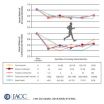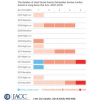(Press-News.org) The study, published in the Proceedings of the National Academy of Science, investigated the extent to which improvements in living conditions and educational opportunities over a person's life affect cognitive abilities and their implications for men and women.
"Our results show that there is no reason to expect all cognitive gender differences will diminish," says Daniela Weber, IIASA researcher and lead author of the study. "However, the findings from this study suggest that if women and men had equal levels of education, then we should expect a female advantage in episodic memory, a male advantage in numeracy, and no gender differences in category fluency (such as naming as many different animals as possible within one minute)."
The authors examined data from the "Survey of Health, Ageing, and Retirement in Europe" in which more than 31,000 men and women over the age of 50 from 13 European countries answered questions that tested cognitive functions including memory, mathematical ability, and verbal fluency.
Analysis of the data showed gender differences in cognitive abilities to be associated with the age of the participant, country of origin, and the living conditions and educational opportunities participants were exposed to when entering adulthood and middle age.
The study demonstrates how the magnitude of cognitive gender differences varied systematically across regions and birth cohorts. In regions that had undergone improvements in living conditions and expansion of gender-equal educational opportunities, women displayed superior memory to men, men's advantage in mathematical abilities decreased, and equivalent abilities in category fluency were observed.
"The results suggest that we should expect that women demonstrate relative strength in particular cognitive functions while men in others, even in societies with higher living conditions and more gender equal educational opportunities," explains Weber.
Previous studies have shown that men have an advantage in tasks assessing visuospatial and mathematical abilities, whereas women are found to outperform men in tasks assessing episodic memory and reading literacy, with no differences normally observed in category fluency and vocabulary. In addition some research proposes biologically based explanations for these differences in cognitive abilities between the genders, whereas others indicate that societal factors influence the gender differences.
INFORMATION:
Reference
The Changing Face of Cognitive Gender Differences in Europe, Daniela Weber, Vegard Skirbekk, Inga Freund, and Agneta Herlitz. Proceedings of the National Academy of Science (PNAS Early edition http://www.pnas.org/cgi/doi/10.1073/pnas.1319538111)
Gender disparities in cognition will not diminish
Improved living conditions and less gender-restricted educational opportunities reduce the cognitive disparities between men and women or improve the gap in favor of women, according to new research by the IIASA
2014-07-28
ELSE PRESS RELEASES FROM THIS DATE:
Running reduces risk of death regardless of duration, speed
2014-07-28
Running for only a few minutes a day or at slow speeds may significantly reduce a person's risk of death from cardiovascular disease compared to someone who does not run, according to a study published today in the Journal of the American College of Cardiology.
Exercise is well-established as way to prevent heart disease and it is component of an overall healthy life, but it is unclear whether there are health benefits below the level of 75 minutes per week of vigorous-intensity activity, such as running, recommended by the U.S. government and World Health Organization.
Researchers ...
Endurance runners more likely to die of heat stroke than heart condition
2014-07-28
Heat stroke is 10 times more likely than cardiac events to be life-threatening for runners during endurance races in warm climates, according to a study published today in the Journal of the American College of Cardiology. The authors noted the findings may play a role in the ongoing debate over pre-participation ECG screenings for preventing sudden death in athletes by offering a new perspective on the greatest health risk for runners.
Two of the most recognized causes of sudden death during an endurance race are arrhythmic death, sudden death usually caused by undetected ...
Learning the smell of fear: Mothers teach babies their own fears via odor, research finds
2014-07-28
ANN ARBOR, Mich. — Babies can learn what to fear in the first days of life just by smelling the odor of their distressed mothers, new research suggests. And not just "natural" fears: If a mother experienced something before pregnancy that made her fear something specific, her baby will quickly learn to fear it too -- through the odor she gives off when she feels fear.
In the first direct observation of this kind of fear transmission, a team of University of Michigan Medical School and New York University studied mother rats who had learned to fear the smell of peppermint ...
New study confirms water vapor as global warming amplifier
2014-07-28
MIAMI – A new study from scientists at the University of Miami Rosenstiel School of Marine and Atmospheric Science and colleagues confirms rising levels of water vapor in the upper troposphere – a key amplifier of global warming – will intensify climate change impacts over the next decades. The new study is the first to show that increased water vapor concentrations in the atmosphere are a direct result of human activities.
"The study is the first to confirm that human activities have increased water vapor in the upper troposphere," said Brian Soden, professor of atmospheric ...
Impact of Deepwater Horizon oil spill on coral is deeper and broader than predicted
2014-07-28
A new discovery of two additional coral communities showing signs of damage from the Deepwater Horizon oil spill expands the impact footprint of the 2010 spill in the Gulf of Mexico. The discovery was made by a team led by Charles Fisher, professor of biology at Penn State University. A paper describing this work and additional impacts of human activity on corals in the Gulf of Mexico will be published during the last week of July 2014 in the online Early Edition of the journal Proceedings of the National Academy of Sciences.
"The footprint of the impact of the spill ...
The bit of your brain that signals how bad things could be
2014-07-28
An evolutionarily ancient and tiny part of the brain tracks expectations about nasty events, finds new UCL research.
The study, published in Proceedings of the National Academy of Sciences, demonstrates for the first time that the human habenula, half the size of a pea, tracks predictions about negative events, like painful electric shocks, suggesting a role in learning from bad experiences.
Brain scans from 23 healthy volunteers showed that the habenula activates in response to pictures associated with painful electric shocks, with the opposite occurring for pictures ...
Cell's recycling center implicated in division decisions
2014-07-28
Most cells do not divide unless there is enough oxygen present to support their offspring, but certain cancer cells and other cell types circumvent this rule. Researchers at The Johns Hopkins University have now identified a mechanism that overrides the cells' warning signals, enabling cancers to continue to divide even without a robust blood supply. In the process, the researchers found that lysosomes — the cell's protein "recycling centers" — help govern cell division decisions. They also uncovered new evidence that certain drugs can halt the growth of tumors that have ...
Facial features are the key to first impressions
2014-07-28
A new study by researchers in the Department of Psychology at the University of York shows that it is possible to accurately predict first impressions using measurements of physical features in everyday images of faces, such as those found on social media.
When we look at a picture of a face we rapidly form judgements about a person's character, for example whether they are friendly, trustworthy or competent. Even though it is not clear how accurate they are, these first impressions can influence our subsequent behaviour (for example, judgements of competence based on ...
Scripps Florida scientists find genetic mutations linked to salivary gland tumors
2014-07-28
JUPITER, FL - July 28, 2014 – Research conducted at the Florida campus of The Scripps Research Institute (TSRI) has discovered links between a set of genes known to promote tumor growth and mucoepidermoid carcinoma, an oral cancer that affects the salivary glands. The discovery could help physicians develop new treatments that target the cancer's underlying genetic causes.
The research, recently published online ahead of print by the Proceedings of the National Academy of Sciences, shows that a pair of proteins joined together by a genetic mutation—known as CRTC1/MAML2 ...
Glucose 'control switch' in the brain key to both types of diabetes
2014-07-28
Researchers at Yale School of Medicine have pinpointed a mechanism in part of the brain that is key to sensing glucose levels in the blood, linking it to both type 1 and type 2 diabetes. The findings are published in the July 28 issue of Proceedings of the National Academies of Sciences.
"We've discovered that the prolyl endopeptidase enzyme — located in a part of the hypothalamus known as the ventromedial nucleus — sets a series of steps in motion that control glucose levels in the blood," said lead author Sabrina Diano, professor in the Departments of Obstetrics, Gynecology ...
LAST 30 PRESS RELEASES:
Cosmic rays streamed through Earth’s atmosphere 41,000 years ago
ACP issues clinical recommendations for newer diabetes treatments
New insights into the connections between alcohol consumption and aggressive liver cancer
Unraveling water mysteries beyond Earth
Signs of multiple sclerosis show up in blood years before symptoms
Ghost particle on the scales
Light show in living cells
Climate change will increase value of residential rooftop solar panels across US, study shows
Could the liver hold the key to better cancer treatments?
Warming of Antarctic deep-sea waters contribute to sea level rise in North Atlantic, study finds
Study opens new avenue for immunotherapy drug development
Baby sharks prefer being closer to shore, show scientists
UBC research helps migrating salmon survive mortality hot-spot
Technical Trials for Easing the (Cosmological) Tension
Mapping plant functional diversity from space: HKU ecologists revolutionize ecosystem monitoring with novel field-satellite integration
Lightweight and flexible yet strong? Versatile fibers with dramatically improved energy storage capacity
3 ways to improve diabetes care through telehealth
A flexible and efficient DC power converter for sustainable-energy microgrids
Key protein regulates immune response to viruses in mammal cells
Development of organic semiconductors featuring ultrafast electrons
Cancer is a disease of aging, but studies of older adults sorely lacking
Dietary treatment more effective than medicines in IBS
Silent flight edges closer to take off, according to new research
Why can zebrafish regenerate damaged heart tissue, while other fish species cannot?
Keck School of Medicine of USC orthopaedic surgery chair elected as 2024 AAAS fellow
Returning rare earth element production to the United States
University of Houston Professor Kaushik Rajashekara elected International Fellow of the Engineering Academy of Japan
Solving antibiotic and pesticide resistance with infectious worms
Three ORNL scientists elected AAAS Fellows
Rice bioengineers win $1.4 million ARPA-H grant for osteoarthritis research
[Press-News.org] Gender disparities in cognition will not diminishImproved living conditions and less gender-restricted educational opportunities reduce the cognitive disparities between men and women or improve the gap in favor of women, according to new research by the IIASA





